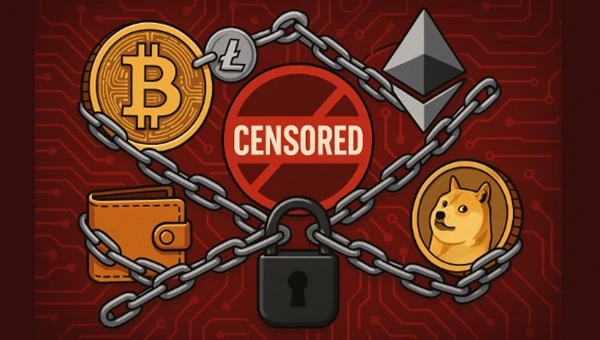
Sixteen years later, that promise faces a slow squeeze. Frozen stablecoins and state-backed wallet takeovers are reshaping the landscape into something early believers never thought they’d see.
Bitcoin and early blockchain networks operated on a simple premise. Miners or validators confirmed transactions through a decentralized consensus process, and once confirmed, transactions were immutable. Today, certain assets can be halted at will.
Tether’s USDT is a prime example. Since mid-2024, over $126 million in USDT has been frozen through partnerships with blockchain analytics firms and law enforcement. The justification is usually linked to combating fraud or terrorism financing, but the effect is clear: stablecoins now operate with levers of control that resemble traditional banking.
The story is similar on newer blockchains. In May 2025, Cetus DEX on Sui was hacked for over $220 million. Validators quickly froze about $162 million and later moved the funds into a recovery wallet after a governance vote. Supporters praised the move for saving investor funds. Critics argued that if validators can unilaterally halt transactions, decentralization becomes more of a slogan than a reality.
Authorities are also taking a more active role. In July 2025, the UK’s Serious Fraud Office froze Bitcoin and USDC worth roughly £10,865 from a high-profile corporate fraud investigation. Under updated laws, authorities can now secure crypto assets on “reasonable suspicion,” even before a conviction.
The Rise of Freeze Orders and State Intervention
New powers to freeze and seize crypto have been written into law in multiple jurisdictions. The UK introduced Crypto Wallet Freezing Orders that allow enforcement agencies to halt funds in wallets not directly tied to the accused. This follows a broader trend in Europe, North America, and Asia where regulatory frameworks are designed to integrate crypto into the existing legal system. While this may protect consumers in fraud cases, it also builds the infrastructure for rapid and sometimes pre-emptive control.
The United States has taken a different but equally influential path. In March 2025, the government created a Strategic Bitcoin Reserve, repurposing seized BTC into a national asset. The move signaled that crypto is no longer viewed solely as a market instrument but as part of state financial planning.
Privacy-focused services once held a central place in the crypto ethos. Tools like Samourai Wallet promised anonymity through transaction mixing. That changed in April 2024 when U.S. prosecutors charged its founders with facilitating money laundering. The arrest marked a turning point. Privacy is no longer a given; it is a contested space subject to regulatory shutdowns.
Similarly, exchanges like WazirX and Garantex have faced freezes and seizures due to alleged links with sanctioned entities or cybercrime. Even users without direct involvement have found their assets locked during investigations, raising concerns about due process in the digital asset space.
The Security Versus Freedom Trade-Off
Supporters of intervention argue that without freeze capabilities, stolen or illicit funds are lost forever. They point to cases like the Sui freeze, where decisive action prevented hundreds of millions in losses. Opponents counter that every layer of control introduced into crypto moves it closer to the traditional financial system it was meant to replace.
There is no denying that regulatory collaboration has reduced some risks. Tether’s frozen funds have often been linked to scams or sanctioned groups. However, these interventions also create dependencies on centralized authorities. The moment those authorities overreach, the user protections that decentralization once promised are gone.
The transformation of crypto from a decentralized frontier to a regulated, partly centralized ecosystem is not just a technical story. It is about the balance between security, legality, and personal freedom. For some, the changes represent necessary maturity. For others, they are a slow betrayal of the ideals that made Bitcoin a cultural and financial milestone.
What is clear is that the space is at a crossroads. If the trend toward centralization continues unchecked, the term “permissionless” may become more of a branding slogan than a lived reality. Yet as long as there are developers and communities committed to true decentralization, there remains a countercurrent pushing against the tide.
Why It Matters?
Crypto’s story isn’t just tech-forward jargon, but about freedom, control, and trust. When networks freeze stolen funds, governments seize digital assets, or institutions centralize custody, the narrative shifts. Crypto risks becoming another regulated arm of finance; no longer a frontier, but a refined tool, securer, perhaps, but less liberating.
He has worked with several companies in the past including Economy Watch, and Milkroad. Finds writing for BitEdge highly satisfying as he gets an opportunity to share his knowledge with a broad community of gamblers.
Nationality
Kenyan
Lives In
Cape Town
University
Kenyatta University and USIU
Degree
Economics, Finance and Journalism


Facts Checked by Will Wood



 Fact checked by
Fact checked by 
 eabungana@gmail.com
eabungana@gmail.com 